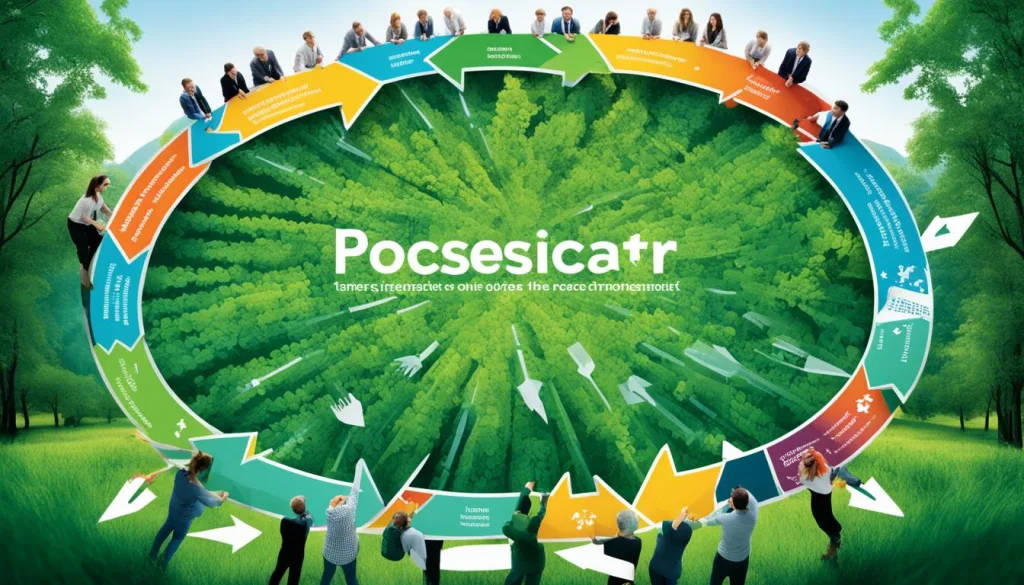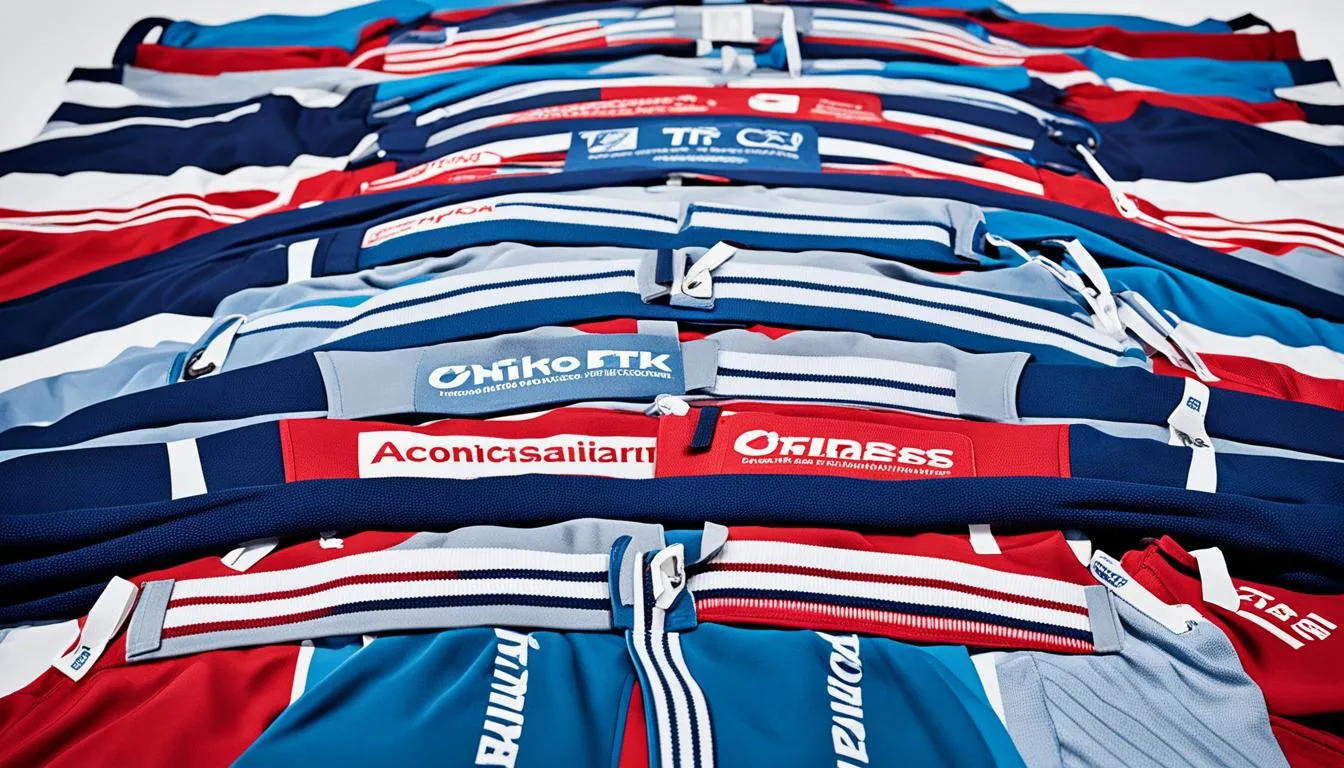The Role of NGOs in Promoting Supply Chain Transparency
Connect With Us Today
Consider us for your next production run. Why wait? Send us your questions here.
In the realm of global trade, supply chain transparency is essential. It’s a key part of corporate social responsibility. NGOs play a big role in this area. They watch over ethical sourcing and make sure companies are accountable. They are about 1.5 million strong in the United States alone1.
NGOs lead the way in promoting transparency. They help everyone know more about where products come from. This makes transparency a standard for businesses all around the world.
Key Takeaways
- Understanding the indispensable role of NGOs in enhancing supply chain transparency.
- Exploring how non-governmental organizations encourage corporate social responsibility through accountability measures.
- Recognizing the significance of ethical sourcing and the pursuit of trusted transparency initiatives.
- Uncovering the impact of NGOs’ promotion of transparency for informed consumer decision-making.
- Highlighting the breadth of NGO influence on global supply chain dynamics.
NGOs as Catalysts for Ethical Supply Chain Practices
NGOs play a crucial role in making supply chains sustainable. They work hard to ensure companies act ethically toward the environment. By pushing the fashion industry to be more responsible, these groups help create a new era of honest business.
The Emergence of NGO Involvement in Sustainable Supply Chains
NGOs are now central to creating sustainable supply chains. They see how global trade affects local lives and push for better practices. To meet this goal, they work with others to reduce harm to our planet2.
Their efforts challenge the way we trade in major goods like soya and palm oil. Thanks to NGOs, there’s a shift toward more sustainable trade2. The New York Declaration on Forests, backed by many, shows a big move in improving supply chain management2.
Fashion Industry Under Scrutiny: A Case for Transparency
The fashion world is being watched closely for its complex supply chains. Transparency has become a must. In one year, more companies began sharing who supplies their goods, showing a shift toward openness3.
This move towards being more open is boosting sales and gaining investors’ trust. Investors now care about working conditions. Also, customers trust companies more when they know where products come from, leading to better business success3.
Strategies of NGOs to Foster Ethical Corporate Behavior
NGOs are driving change by promoting honesty. They bring together companies, unions, and others to tackle supply chain issues more effectively3. By doing this, they make trade more ethical and sustainable3.
Even with more information out there, we still need to talk more about if transparency really works2. NGOs believe being clear on how things are done will lead to better business ethics. They offer hope for a more ethical future in business2.
The Interplay Between NGOs and Corporate Transparency
NGOs play a key role in enhancing corporate transparency and connecting with stakeholders. They work from local groups to big global organizations. This shows their broad influence in striving for openness and teamwork. In 2009, India had a remarkable 2 million NGOs1. This equals about one NGO for every 600 people, highlighting how NGOs can deepen engagement in seeking transparency.
In the U.S., the relationship between NGOs and corporate transparency is highlighted by the presence of around 1.5 million NGOs14. These groups focus on various causes, such as human rights and the environment. They get funding from different sources, like donations, corporate ties, and government support4. This diversity shows many ways companies can work with NGOs to improve transparency.
The harmonious interplay between NGOs and businesses is fundamental in sharpening corporate transparency and promoting a more ethically responsible corporate ethos. This collaborative pursuit results in more intricate and accountable supply chain practices.
NGOs in the U.S. have a lot of freedom to advocate and express themselves4. This opens the door for free dialogue and work with businesses. The inclusion of foreign NGOs, which can register in the U.S. without too much trouble4, also adds to global engagement and teamwork possibilities.
Working together is key in raising transparency standards. NGOs guide and monitor companies, moving them towards more accountability. They also reflect public opinion. This cooperation is not just about being open but also about building trust and legitimacy in society.

- Community-based Organizations (CBOs)
- City-wide Organizations
- State NGOs
- National NGOs
- International NGOs (INGOs)
| Country | Estimated NGOs | NGO Orientation | Funding Sources |
|---|---|---|---|
| Russia (2008) | ~277,0001 | Varied | N/A |
| India (2009) | ~2 Million1 | Human Rights, Development | N/A |
| USA (Current) | ~1.5 Million14 | Foreign Policy, Environment | Private Donations, Government Grants4 |
Regulatory Frameworks and NGO Pressure
In the world of supply chain management, non-governmental organizations (NGOs) play a big role. In the United States4, around 1.5 million NGOs4 push for changes in global issues like environmental policies and economic development. Their large number allows them to strongly influence regulations. These regulations help make company actions more clear and honest, especially in sectors that used to lack such guidance.
Coercive, Normative, and Mimetic Isomorphic Processes
Organizations change through three key ways within their frameworks. Coercive processes make companies follow specific standards through legal pressure. Normative processes involve adapting to professional norms and standards. Companies also imitate successful strategies through mimetic processes. These mechanisms help shape corporate behavior towards being more ethical and transparent.
Strategic Corporate Reactions to Institutional Pressures
Companies change their ways in response to outside pressures. They might simply comply with new practices or be more innovative. These efforts range from doing the minimum to going beyond what’s expected. They cite reasons like social responsibility and staying competitive.
NGOs in the U.S. also affect where money goes. They can get tax breaks and give donors tax deductions4. This setup helps NGOs work effectively without harming their goals or structure4.
For example, U.S. laws allow foreign NGOs to operate freely4. They can run as non-profits without strict rules on foreign money. This lets NGOs play a key role in shaping rules that everyone must follow.
More companies now see how NGOs influence them and the need for greater openness. This changes how they view their role in the supply chain.
Building a Transparent Supply Chain: The NGO Influence
NGO influence has greatly boosted the push for a transparent supply chain. NGOs are important in pushing for sustainability initiatives. Their efforts have made a big difference in making businesses more transparent. The Modern Slavery Act 2015 is a key example. It requires large UK companies to report their actions against slavery and human trafficking. This shows how NGOs can lead to changes in the law through their work5.

Recognizing the importance of businesses and NGOs working together is key. This partnership helps reveal the hidden parts of supply chains. Today, companies are doing more than what the law requires. They are moving towards full transparency. This includes being open when no action has been taken against modern slavery. It’s becoming normal for businesses to operate transparently, thanks to this team effort5.
| Legislative Driver | Corporate Response | NGO Impact |
|---|---|---|
| Modern Slavery Act 2015 | Annual Slavery and Human Trafficking Statements | Advocacy and Monitoring |
| £36 Million Turnover Threshold | Transparency in Operations | Setting Accountability Standards |
| Race Towards Enhanced Practices | Proactive Engagement Beyond Compliance | Fostering Ethical Supply Chains |
NGOs are central in driving companies to do better than just the bare minimum. They aim to prevent modern slavery not just within companies but in all their dealings. The UK government supports this proactive stance5. This strong partnership between laws, business interests, and NGOs leads to a supply chain everyone can trust. It benefits everyone, especially consumers who care about where their products come from.
To truly understand a transparent supply chain, it’s important to see how laws and ethics come together. NGOs play a big role. They keep a close eye on companies and work with them. Their goal is to make business more sustainable and ethical.
The Role of NGOs in Promoting Supply Chain Transparency
In the world of global trade, NGOs have become key in pushing for supply chain transparency. They work hard to make sure companies meet ethical standards. This doesn’t just raise the bar for industries; it also lets shoppers make smart choices, making businesses more accountable everywhere.
Collaborative Engagements Between NGOs and Companies
NGOs often team up with companies to help them be more open. This can include giving advice or helping with audits. By working together, NGOs push brands to share where their products come from. This push has led to more brands revealing their suppliers, a big step forward for transparency.6
Direct Actions of NGOs: Campaigns and Public Disclosures
NGOs also make waves with campaigns and making info public. Take the Fair Labor Association (FLA), for instance. It got over 50 brands to list their factories, aiming for full transparency by a set deadline. This shows how NGOs can really push industries to be more open and responsible6.
The Impact of NGO Pressure on Supply Chain Transparency
The push from NGOs leads to big changes across the board. Many joined forces to get companies to share more about their supply chains. This includes groups in the Netherlands sharing factory info since 2017. Thanks to these efforts, there’s a growing expectation for brands to not just comply, but to lead the way in transparency6.
FAQ
What is the role of NGOs in promoting supply chain transparency?
Why are NGOs involved in sustainable supply chains?
How does the fashion industry showcase the need for transparency in supply chains?
What strategies do NGOs employ to foster ethical corporate behavior?
How do NGOs and companies collaborate to enhance supply chain transparency?
What are coercive, normative, and mimetic isomorphic processes?
How do companies react strategically to institutional pressures?
How do NGOs influence sustainability initiatives and promote transparency?
How do NGOs engage in collaborative engagements with companies to promote supply chain transparency?
What are the direct actions taken by NGOs to promote supply chain transparency?
What is the impact of NGO pressure on supply chain transparency?
Source Links
- https://en.wikipedia.org/wiki/Non-governmental_organization
- https://www.ncbi.nlm.nih.gov/pmc/articles/PMC6686968/
- https://www.ethicaltrade.org/sites/default/files/shared_resources/eti_transparency_business_case.pdf
- https://www.state.gov/non-governmental-organizations-ngos-in-the-united-states/
- https://www.gov.uk/government/publications/transparency-in-supply-chains-a-practical-guide/transparency-in-supply-chains-a-practical-guide
- https://www.hrw.org/report/2019/12/18/fashions-next-trend/accelerating-supply-chain-transparency-apparel-and-footwear
Latest News
How Collaboration Shapes Consumer Preferences in Sportswear
Navigating Consumer Rights and Warranties in Sportswear Sales
Artificial Intelligence in Fashion Forecasting and Trend Analysis
The Shift Towards Inclusive Sizing in Sportswear: Consumer Reactions
The Global Expansion of Luxury Sportswear Brands
From Sketch to Gym: The Design Process of Fashionable Sportswear
Understanding the Role of Trade Associations in Sportswear Compliance
How Economic Trends Influence Consumer Spending on Sportswear
Learning from Successful Global Market Entries
Best Practices for Managing Cross-Cultural Teams
Using Technology to Fight Counterfeit Fashion Products
Carbon Nanotube Fabrics for Superior Strength and Flexibility
The Growth of Fitness Tracking Apparel in Health and Wellness
Exploring the Influence of Social Proof in Sportswear Purchasing
Strategies for Managing Compliance in a Multinational Operation
Trends in Global Footwear: Performance Meets Lifestyle
The Role of Artificial Intelligence in Tracking Supply Chain Operations
Evaluating the Success of Sportswear Collaborative Projects
Evaluating the Potential of Emerging Markets
Global Shifts Towards Gender-Neutral Sportswear
Share This Article
Latest Articles



















